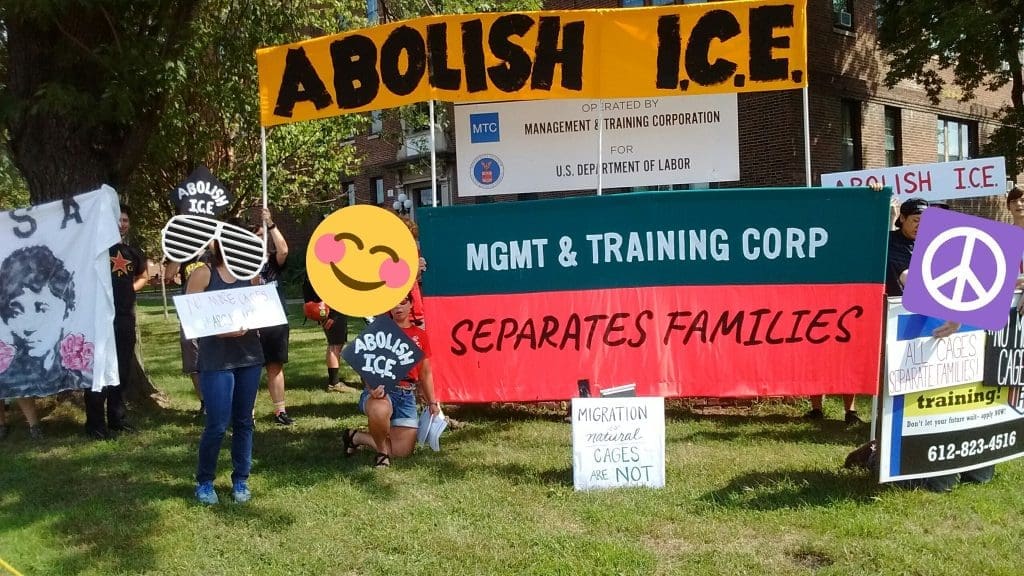Transcribed from the 29 September 2018 episode of This is Hell! Radio (Chicago) and printed with permission. Edited for space and readability. Listen to the whole interview:
Banks and financial institutions play a critical role in funding the private prison companies, who literally would not be able to function without constant debt financing. There would not be an immigration system in this country without the active work of these private institutions.
Chuck Mertz: Immigration activists have found common cause with rights groups of all kinds, and they’re now going after those profiting from the Trump administration’s zero tolerance policy that’s tearing families apart at the border. Hear to tell us what’s happening in the immigration rights movement, live from Los Angeles, investigative journalist David Dayen wrote the In These Times piece “Below the Surface of ICE, the Corporations Profiting from Immigrant Detention: activists are targeting the companies that make ICE run.”
Welcome back to This is Hell!, David.
David Dayen: Thank you for having me on.
CM: You write, “In late July, activists with Make the Road New York and other anti-ICE groups blocked Park Avenue underneath the Upper East Side roof-level penthouse of JPMorgan Chase CEO Jamie Dimon, rather than outside a government building [as protesters in California were doing two days earlier].
“JPMorgan Chase holds no direct contract with ICE and doesn’t handle financial services at ICE facilities, but it does enable and profit from the private prison duopoly of Geo Group and CoreCivic, which operate most US migrant detention centers. Since Donald Trump took office, JPMorgan has increased its stockholdings in Geo Group and CoreCivic by 15,600 percent. The bank has also provided at least $167.5 million in debt financing to the two companies, which rely on borrowed money.”
How much does the mass detention industry depend upon JPMorgan Chase for its very existence?
DD: JPMorgan Chase certainly plays a large role; many private companies play a large role. When ICE and the current immigration system got launched, it was with the founding of the Department of Homeland Security in 2002, and this was really at the height of the Bush administration’s initiatives on privatization. The way that the Department of Homeland Security got formed was through that lens. Virtually all activities undertaken by the major immigration agencies—particularly the ones involved in this family separation policy—are carried out by private companies.
In the case of JPMorgan Chase and other financial institutions, they play a critical role in funding the private prison companies, who literally would not be able to function without constant debt financing from banks and other financial institutions. There would not be an immigration system in this country without the active work of these private institutions.
What the activists have figured out is that we have a better chance of making headway by going after these consumer-facing private companies, like banks and tech firms, than going to the Trump administration and saying, “Hey, you should change your immigration policies,” because that’s going to fall on deaf ears. They’re trying to make ICE and the immigration system toxic enough that these private sector partners will separate from it. That’s going to take some sustained engagement, but that’s what’s been going on.
CM: Considering that ICE came about and was created during the Bush era of privatization, in 2002, what can we learn from this kind of privatization of an agency—an agency born out of privatization—and what it means for creating government agencies in the future? Is there a lesson to be learned here from ICE being born out of privatization?
DD: It’s a double-edged sword. There were obvious reasons why the government wanted to privatize these various factions. First of all, there is a lot of work that needs to be done all over the country—ICE imprisons an average daily population of over forty-one thousand migrants. And yet its enforcement and removal operations (which includes the tracking, capturing, warehousing, and transporting of these migrants) only has six thousand people working in that sector. Seventy-two percent of migrants who are detained are in private detention beds.
And there are good reasons for that: it provides opacity. It’s not transparent; it’s often not subject to public records requests. We don’t know what’s going on in the facilities because the facilities are privately run. Things have a certain plausible deniability. If there are problems at the facility, “that’s just because of the contractor”; it’s because of CoreCivic or the medical contractor or the food contractor that detainees are getting sick (or whatever it is).
Those are some of the reasons privatization might have made sense to the government. The flipside of that is that privatizing these operations, means having in the mix companies that might be on the stock exchange and that might have consumers who have consciences. There are more pressure points on getting a policy changed than if it were all just a public operation and the only way to change it were through the electoral process.
CM: You write, “The corporations get paid whether the beds are full or not, arguably providing government an incentive to seek out prisoners so as not to ‘waste money.’” Does the supply of beds, then, drive demand for detainees?
That’s the kind of market logic I would expect from privatization. It’s amazing that for many years in this country we have had a detention bed mandate. It’s a rider that was put into the appropriations bill; it was way back in 2009, I believe, when it started. And it says that you have to have thirty-four thousand beds available for migrants whether they are full or not. As you said, these beds will be operated and managed and these private contractors will be paid a flat rate whether their beds are full or not.
DD: Yes, this does provide an incentive. It’s easy to say, “Hey, why are we paying these companies for empty beds?” That’s something that can be used in campaign rhetoric or just to make government look bad. It is a cruel form of market logic. And it’s interesting how the activism that’s grown out of the zero tolerance policy, while obviously having a moral component (seeing kids in cages, ripped away from their families, etcetera), has focused on this brutal logic of capitalism.
When there are contracts sent out to the private sector, the private sector has to put a layer of profit on to make it worth their while, and still come in under the budget that it would take for the public sector to just provide the service themselves. That leads to all kinds of cut corners. It leads to the horrible allegations that we’ve heard about food that’s inedible, medical attention that’s completely inadequate, children who end up covered in lice—absolute horror stories. This is a function of the market system that has been put in place for warehousing these people.
The system has mistreated migrants for many, many years. It has been opaque, impenetrable, with no public understanding of what’s going on. But obviously the family separation policy has put a spotlight on these practices, and it’s provided a strategy for going after the firms that partner with the immigration authorities.
CM: There’s a complete lack of oversight and enforcement, and as you were pointing out, that’s because these systems of privatization are often self-regulating; that makes it so politicians can’t be held responsible, agencies can’t be held responsible, and because they’re doing their own self-regulating, these companies of course don’t hold themselves responsible.
There have been so many headlines about the abuse of children in migrant detention centers. Are we seeing any improvement in the treatment that they’ve been getting? Or are these companies so impervious to public criticism that they’re just continuing the same way they’ve been operating this whole time?
DD: This is going to be a long process to really challenge this system. It’s been this way for a number of years. It predates Trump. The system has mistreated migrants for many, many years. It has had these characteristics of being opaque, impenetrable, with no public understanding of what’s going on there. But obviously the family separation policy has put a spotlight on these practices, and it’s provided a strategy for going after the firms that partner with the immigration authorities.
There have been successes at certain levels. There have been a couple companies that have said they’re not going to continue contracts with ICE or other immigration authorities. There have been cities that have said they don’t want to partner with ICE or have ICE facilities. That includes liberal cities and counties like Contra Costa County in California, but it also includes Williamson County, Texas, which is a pretty conservative place; they have decided that they don’t want to continue to house the Hutto immigrant detention center, because of its relationship to family separation. ICE is scrambling to keep those facilities alive or move those facilities elsewhere, and at some point if the movement gets big enough, they won’t be able to find any place to site these facilities.
One really interesting issue has been when Geo Group wanted to take over prison re-entry services at a DOC facility in Lancaster County, Pennsylvania: the contract had nothing to do with the immigration debate at all, but Lancaster County rejected that attempt because of Geo Group’s association with family separation.
We’ve also seen instances where investments have been canceled—there’s been a divestment campaign in New York City with their pension funds; same in New York State, and in Philadelphia. The American Federation of Teachers is trying to take that a step further by going after hedge funds, saying that teacher pension funds should divest from hedge funds that have investments in CoreCivic and Geo Group.
This is only going to grow. We’re at the beginning of this process. The pressure is only going to get higher, and if it succeeds there is some question as to whether these private prison companies—as well as other contractors, tech firms, etcetera—can continue to do business with ICE and other immigration authorities. That’s where we might see some change.
CM: You write about all the different corporations that are involved with ICE: “Consulting firm Deloitte earned eighteen million dollars in 2017 for case management; Salesforce has a software contract with Customs and Border Protection; Microsoft handles ICE’s data processing; an obscure surveillance firm called Pen-Link provides ICE with ‘real-time tracking’ through cellphone and geolocation data; another logistics/infrastructure contract with Palantir (a Silicon Valley data-mining firm owned by libertarian Trump supporter Peter Thiel) uses Amazon’s cloud computing storage.”
To what extent are the biggest companies in the US—the biggest banks, the biggest Silicon Valley firms, the biggest consulting firms—all invested in and profiting from mass detention? I mean, I am opposed to this mass detention and zero tolerance policy when it comes to immigration, and looking at this list (you also mention Comcast), I’ve got to cut my cable, I’ve got to quit buying stuff from Amazon, I’ve got to end my Chase account.
How much would that help? How far would my individual actions of no longer patronizing individual businesses go towards changing ICE policy?
DD: It would have to be part of the larger movement. Yes, there are consumer campaigns around this—not necessarily just moving your money or doing business with somebody else, but petitioning these companies, as customers, not to do business with something you find abhorrent. Is one person changing their bank account going to break the back of JPMorgan Chase? Maybe not. But there are also large investors who are being pressured to go away from these companies. And there are workers inside these firms—Salesforce, Amazon, Microsoft—who are organizing, in many cases, for the first time as well. There is worker-led organizing in Silicon Valley, with workers saying they don’t want to work on these products, and they don’t want to have their company profiting from the immigration system. That is only going to grow.
Salesforce has an annual event called Dreamforce in San Francisco, and just last week activists brought a giant cage, to simulate the caging of immigrants, into the Dreamforce conference. Salesforce attempted to moderate their image by giving a large grant to an organization doing work on the border helping migrants by bailing them out of various facilities and helping them get on their feet—and that organization, RAICES, sent it back.
There are ways, beyond just personal consumer choices, to make your voice heard and say that if these companies are going to be complicit with ICE, they’re going to feel the effects of that. That’s really what the activist strategy is.
This is an opportunity to build a coalition outside of silos—whether we’re talking about economic policy, or environmental policy, or immigration policy—and bring together the seemingly disparate factions of the “fractured left,” working toward a common goal.
CM: We’ve talked with Zoë Quinn, who was the target of the #Gamergate harassment campaign, and she told us about how Silicon Valley was full of people who were mostly on the far right. Does Silicon Valley’s reaction to zero tolerance immigration policies signal to you some sort of change in Silicon Valley, politically?
DD: There is a change happening across the board, and Silicon Valley is a really interesting part of this. This worker-led organizing has bled over—it hasn’t stopped with just immigration or zero tolerance. There are workers inside these companies now talking about more diversity in hiring. They’re talking about anti-discrimination on the job. They’re coming up with a mentality as workers that wasn’t there before. When you get that, it’s not unlike unionizing a plant or an industrial sector; union workers suddenly have greater consciousness about various issues, whether they are economic or social. We’re seeing that in Silicon Valley.
The public, by and large, is pretty broadly opposed to the kinds of immigration policies that we’re seeing with zero tolerance, ripping families apart, putting minors in cages. This is one way that this is manifesting itself, trying to use the pressure points available to stop this policy when appealing to an administration that is hell-bent on making life miserable for people of color and migrants seems less likely to be successful. The organizers recognize that, and they’re moving to a strategy that they think has a better chance of working, while also pursuing electoral politics to maybe make a change in congress.
Looking to what’s happening inside these firms in Silicon Valley is an example of how change can really happen.
CM: Can the issue of immigration, then, bring the left together? You pointed out that many different organizations, including Black Lives Matter and all sorts of different organizations that are focused on rights, are against the zero tolerance immigration policy of the Trump administration. What examples do you see of immigration issues bringing together what is commonly referred to as the “fractured left”?
DD: These intersections are a really interesting part of this. The fight against zero tolerance is obviously a human rights issue. It’s also a labor rights issue, when we’re talking about workers not wanting to associate themselves with what they see as an immoral policy. It’s also about our economy and how cities that have been abandoned by economic forces have nowhere left to turn but to take in a private detention facility. It’s about finding strategies to change that. It’s about privatization and what that has done to our politics and our economy. It’s about financialization. These private prison companies rely on debt financing, and that shows how Wall Street can dictate policy in some ways.
It wraps up a lot of different things in one, and that’s why we’re seeing these groups that don’t normally engage on policies of immigration really get involved. The reason I was interested in this story is I got an email from Win Without War, which is an antiwar group that was active during the Iraq and Afghanistan invasions, and they were trying to single out the defense contractors that had contracts for transporting and housing migrants as part of this policy. I thought that was so interesting, that there was a group with seemingly little to connect itself to the immigration debate getting involved in such a meaningful way.
I saw that down the line. While reporting this story, I talked to all sorts of groups that were involved in this, and the breadth of them is really amazing. This could be the policy that shows that you can build a coalition outside of silos—whether you’re talking about economic policy, or environmental policy, or immigration policy—and bring together the seemingly disparate factions of the “fractured left,” as you said, working toward a common goal. Maybe in their own ways, maybe different parts and different angles of it, but working towards something that the entire coalition can get behind. It’s a really interesting case study.
CM: Where were these immigration activists under the Obama administration, when the Obama administration was setting records for deportation? I’m concerned that they will disappear once a Democrat becomes president again, just like the antiwar movement pretty much disappeared once the Bush administration left office, even though the Obama administration then expanded the drone wars.
Do you think this immigration protest will just go away when Joe Biden becomes president and we all kill ourselves?
DD: The core immigration groups were fighting the Obama administration throughout this time. Groups like RAICES, like Grassroots Leadership—many of the immigrant-led organizations have been in this fight for many, many years, and they have said that the Trump administration’s cruelties (which have expanded with regard to family separation) simply revealed and unveiled to the rest of the nation how immigrants are treated in this country, particularly when they come across the border.
Is there fear that this will dissipate if there’s a Democratic president? That fear is very real. It’s going to be up to the leadership of these organizations to make demands and hold accountable whoever comes into power in 2020 (or maybe 2024 or beyond) to ensure that they’re not just adhering to blue-team/red-team sensibility but to real morality and to the rights that are being demanded.
We’ll see. It’s a real challenge. It’s a challenge to sustain amid all the other things that are going on. Sustaining a campaign is what it’s going to take to dislodge JPMorgan Chase from a very profitable investment that they have in the private prison companies. It’s already a challenge, even before we get to a Democratic president. The organizations that are leading this are going to have to rise to that challenge.
CM: Thank you very much for being back on our show, David, it really has been a pleasure.
DD: I appreciate it.





